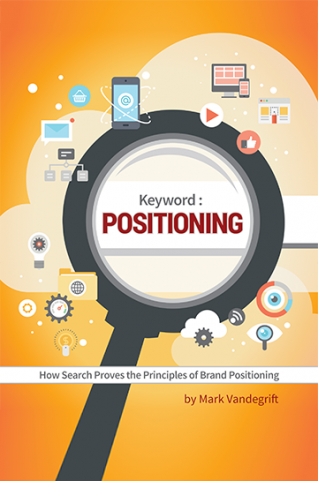One of the principles of positioning is that there is a specific universe who cares about your difference. Not the entire universe, but a group carved out where your difference is high value and meaningful. Many experts call this focus. Some call it a purple cow. Innis Maggiore calls it a good position. Search engine optimization goes hand in hand with positioning.
Regardless of your position, there are inherent key terms which emanate from your difference. Whether it's the industry you're in, the category within that industry, or a product type or name, the most powerful key terms are those relating to your position. Search engine optimization helps make sure you are relevant and meaningful to those who find you on the web.
Like positioning, the keywords must be meaningful and relevant to a company's buying universe. Consider how you search. Not a single word anymore, but specific keywords (aka keyphrases) that help gain you more meaningful search results. Consider the following search funnel:
-
- Category: this is the basic root of the keyphrase and defines the industry, service, or product. Example: car, auto, automobile.
-
- Sub-Category: when necessary, the category will divide. Examples: sports car, minivan, SUV.
-
- Positioned Keyphrase: this is the defining and meaningful difference appended as a prefix or suffix to the root keyword or phrase. Examples: safe car (Volvo), reliable car (Toyota), performance car (BMW), small car (Volkswagen). How would an Internet user likely search for these positioning ideas? Take Volvo. A user is likely to query, "World's safest cars," or "crash test rankings," both of which build off the positioning idea in a way that is most relevant to the user.
-
- Category: this is the basic root of the keyphrase and defines the industry, service, or product. Example: car, auto, automobile.
In the illustration above, the competitive landscape decreases at each level, but the relevant buying universe increases. This aligns exactly with positioning. We know certain groups don't care about our difference. But for the audience who does, the difference is of the highest value.
This is a clear illustration that an organization's competitive universe must be limited to the size that will allow the organization to appear on the competitive map. Why is this? Because the smaller the competitive search results of the keyphrase, the greater the chance the organization will crack the top 10 of the search results - with the ultimate goal of achieving a #1 ranking for its key terms.
While the competitive map should not be minuscule, it must be reduced to a size that reflects a buyer set large enough to keep the organization in business and targeted enough to care about the difference offered by the organization.
Positioning inherently tells us we can't be all things to all people. And search engines do the same. Instead of trying to own every phrase in the English lexicon, identify those you can own/rank highly which will generate traffic to your site. And when your content delivers on your position, leads and sales will come. Search engine optimization ensures the right people are finding you on the web.



